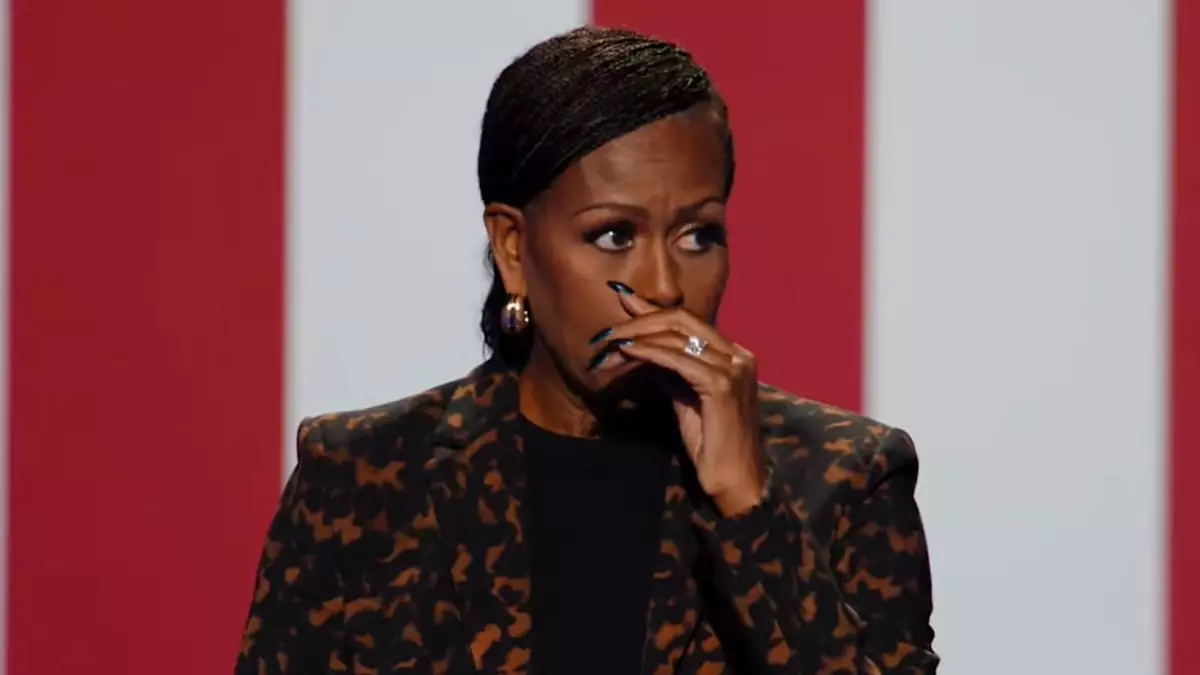On October 26, 2024, Michelle Obama took a significant step onto the political stage in Michigán, passionately advocating for Presidential candidate Kamala Harris. However, beyond the political endorsement, it was her candid discussion of menopause and the accompanying health struggles that truly resonated with the audience and highlighted an overlooked aspect of women’s healthcare. Wearing an elegant tortoiseshell pants suit by Theory, Obama received a warm ovation as she shifted the focus to the multifaceted issues that encompass women’s health in contemporary society.
Michelle’s heartfelt address aimed not only to rally support for Harris but also to emphasize the dire need for a more inclusive understanding of women’s health issues—issues that have historically been shrouded in stigma and shame. By admitting the “debilitating” impact of menopause that many women face, she invited a broader conversation about the need for a cultural shift in how we perceive and discuss women’s health.
With her statement, “We’ve been taught shame and how to hide how our bodies work,” Michelle struck a chord with countless women who silently navigate their health struggles without the necessary support or understanding. The societal pressures that dictate shame around topics like menstrual cramps and menopause serve only to exacerbate the challenges faced by women. “Too many of us suffer from severe cramps and nausea days on end, every single month,” she pointed out, reinforcing the idea that these issues are not merely personal but societal.
This stigma manifests in various domains, leading to women often feeling isolated in their suffering. The statistics are sobering: many women reach menopause without adequate knowledge about what to expect. The lack of dialogue surrounding menopause results in a significant gap in not only awareness but also in the provision of appropriate care. Women, as Michelle highlighted, should not feel the need to “suck up our pain” alone nor should they bear the burden of navigating these health issues in secrecy.
Shifting her focus, Michelle drew attention to the need for a comprehensive understanding of women’s healthcare that extends beyond reproductive issues and encompasses the broader spectrum of the female experience. “A woman’s body is a complicated business…there is so much that can go wrong at any moment,” she emphasized. The health disparities affecting women must be addressed through a systemic lens that recognizes the diverse health challenges they face throughout their lives.
The reality is that, for many women, health crises can manifest unexpectedly, from abnormal pap smears to potentially life-threatening cancers. Michelle poignantly illustrated these concerns when she stated, “In those terrifying moments, which will happen to the vast majority of women in the country, it feels like the floor falls out from under us.” Such vivid descriptions evoke a sense of urgency, calling both women and men to recognize the pivotal role that supportive healthcare plays in all women’s lives.
As her speech continued, Michelle aimed her message at the men in the audience, imploring them to understand the experiences of the women in their lives. The notion that men cannot fully grasp the complexities of female health is, to a degree, accurate. As Michelle asserted, “Most women don’t understand the breadth and depth of our reproductive lives.” The neglect of women’s health by the scientific community has broader implications, particularly for women of color, who are more likely to encounter systemic discrimination.
Michelle’s emotional appeal could not have come at a more critical time. Her warnings regarding the potential consequences of dismantling parts of the healthcare system under a Trump-led regime illuminated the precarious reality for many women and their families. With poignant scenarios, she illustrated the ripple effect of inadequate healthcare access: “Your girlfriend could be in legal jeopardy… your daughter could be the one too terrified to call the doctor.”
Concluding her remarks, Michelle urged everyone to take women’s health seriously, calling for an urgent reevaluation of how women’s experiences are treated within the political sphere. “Do not put our lives in the hands of politicians—mostly men—who have no clue,” she warned, encapsulating the essence of her message. By asserting that women deserve better than to be at the mercy of those unqualified to understand their experiences, she emphasized the importance of advocacy, understanding, and policy influence.
The realities of women’s health are no longer realities to be whispered in the shadows; they are collective responsibilities that demand attention. Obama’s resolute stance challenges us to engage with these issues, not just politically but personally, ensuring that future generations of women will not feel the weight of shame associated with their health. By bringing these topics to the forefront, Obama revitalizes a crucial dialogue that not only affects women but also lays the groundwork for a more equitable healthcare system for all.

